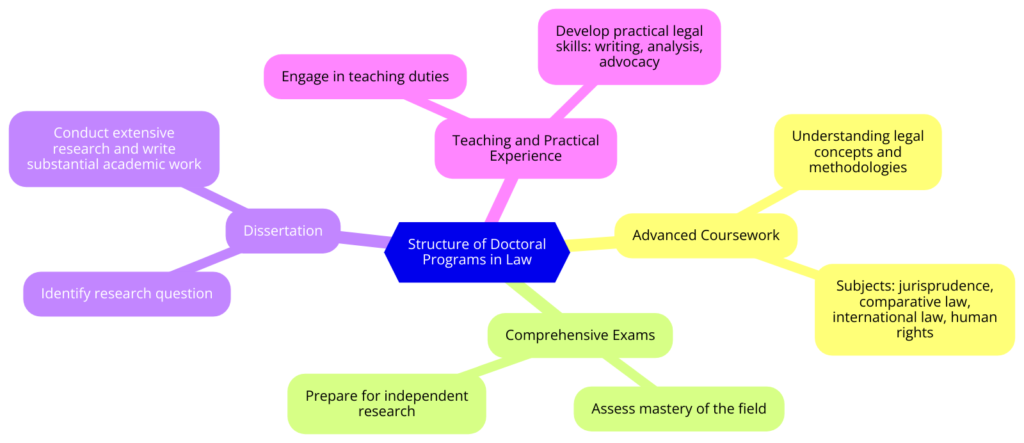Pursuing doctoral studies in law is a journey that bridges the academic rigor of the classroom with the practical demands of the courtroom. This path offers an in-depth exploration of legal theories, methodologies, and applications, equipping scholars with the expertise needed for high-level legal careers. This article aims to provide a comprehensive overview of doctoral studies in law, detailing the structure, importance of research, practical applications, career opportunities, interdisciplinary and global perspectives, and the challenges and rewards associated with this advanced degree. By understanding these elements, prospective doctoral candidates can make informed decisions about their academic and professional futures.
The Structure of Doctoral Programs in Law

Doctoral programs in law, often referred to as PhDs in Law or Doctor of Laws (LL.D.), are meticulously structured to provide a robust foundation in both theoretical and applied legal studies. These programs typically span three to four years and consist of several key components, including advanced coursework, comprehensive exams, and a significant research component culminating in a dissertation. The coursework in the initial phase is designed to deepen understanding of advanced legal concepts and methodologies. This includes subjects like jurisprudence, comparative law, and specialized areas such as international law, human rights, or environmental law.
The comprehensive exams are a critical milestone, assessing the candidate’s mastery of the field and readiness to undertake independent research. Following the exams, candidates focus on their dissertation, which involves identifying a research question, conducting an extensive literature review, and employing rigorous methodologies to investigate their chosen topic. The University of Luxembourg and the University of Auckland emphasize a balanced approach, ensuring that candidates gain both deep theoretical knowledge and practical research skills. This structure prepares candidates not only for academic careers but also for high-level positions in legal practice and policy-making.
The Importance of Research in Legal Studies
Research is the cornerstone of doctoral studies in law, enabling candidates to contribute original knowledge and insights to the field. This process involves a deep dive into specific legal issues, utilizing various research methodologies to analyze and address complex legal problems. Doctoral candidates are required to develop a comprehensive research proposal that outlines their research questions, objectives, and methodologies. This proposal undergoes rigorous scrutiny by academic committees to ensure its feasibility and potential contribution to the field.
Institutions like the University of Lund and UCD Sutherland School of Law highlight the importance of originality, clarity, and methodological soundness in legal research. Research topics can range from examining the intricacies of international treaties, exploring human rights violations, analyzing regulatory frameworks, to investigating the impact of new technologies on law. The goal is to produce a dissertation that not only adds to the academic literature but also has practical implications for legal practice and policy. This emphasis on research ensures that doctoral graduates are well-equipped to address pressing legal issues and contribute to the advancement of legal knowledge and practice.
Practical Applications of Doctoral Studies in Law
Doctoral studies in law are not confined to academic theory; they have significant practical applications that influence legal practice and policy-making. Graduates often pursue careers as legal scholars, educators, policy advisors, and high-level legal practitioners. Their research can lead to influential publications, shape legal education, and inform legislative and judicial processes. Programs emphasize the development of practical skills such as legal writing, critical analysis, and oral advocacy. For instance, Stockholm University’s doctoral program encourages candidates to engage in teaching and departmental duties, fostering skills directly applicable in professional legal environments.
Additionally, doctoral research often addresses real-world legal challenges, providing insights and solutions that can be implemented in practice. This includes drafting policy recommendations, advising on legislative reforms, and participating in high-stakes legal proceedings. The practical training embedded in doctoral programs ensures that graduates are not only proficient in theoretical analysis but also capable of applying their knowledge to solve complex legal problems. This dual focus on theory and practice enhances the relevance and impact of doctoral studies in law, preparing graduates for leadership roles in various sectors.
Career Opportunities and Professional Impact
Earning a doctoral degree in law opens diverse career paths, each offering the opportunity to make significant contributions to the field. Many graduates become professors at prestigious universities, where they engage in teaching, mentoring, and conducting groundbreaking research. Others join think tanks, research institutions, or international organizations, where they influence public policy and legal reforms. Some pursue judicial appointments or high-level positions within governmental and non-governmental organizations, where their expertise helps shape the legal landscape.
For example, doctoral graduates often find roles as policy advisors, providing expert analysis and recommendations on legal issues to governments and international bodies. Their deep understanding of legal principles and ability to conduct thorough research make them valuable assets in the formulation and implementation of laws and policies. Additionally, those who choose to practice law benefit from their advanced training in legal analysis and argumentation, enhancing their effectiveness as advocates and advisors. The Doctor of Law and Policy program at Northeastern University and similar programs at other institutions illustrate how doctoral graduates can leverage their expertise to effect change in various sectors, from academia to public service and private practice.
Interdisciplinary and Global Perspectives
Doctoral programs in law often encourage an interdisciplinary approach, integrating insights from fields such as economics, sociology, political science, and technology. This broadens the analytical framework and enhances the relevance of legal research. For instance, studying the intersection of law and economics can provide valuable insights into regulatory impacts on market behavior, while integrating sociology can help understand the social implications of legal decisions.
Institutions like the University of Graz and the University of Luxembourg promote interdisciplinary research and international collaboration, enabling candidates to address global legal challenges effectively. Exposure to different legal systems and comparative legal studies enriches the doctoral experience and prepares graduates for roles in a globalized legal landscape. This global perspective is particularly important in areas such as international law, human rights, and environmental law, where legal issues transcend national boundaries. By fostering interdisciplinary and international collaboration, doctoral programs equip graduates with the skills and knowledge needed to navigate and influence the complex global legal environment.
Challenges and Rewards
Embarking on doctoral studies in law is both challenging and rewarding. Candidates must demonstrate exceptional academic performance, resilience, and a strong commitment to their research. The journey involves navigating complex legal theories, conducting meticulous research, and contributing original insights to the field. Doctoral candidates often face challenges such as balancing academic demands with personal responsibilities, securing funding for their research, and overcoming intellectual hurdles during their studies.
However, the rewards are substantial. Graduates gain deep expertise, enhance their critical thinking and problem-solving abilities, and achieve a high level of professional recognition. The rigorous training and intellectual growth experienced during the doctoral program provide a solid foundation for a successful legal career. Additionally, the personal satisfaction of contributing to the advancement of legal knowledge and practice is a significant reward in itself. The challenges faced during the doctoral journey ultimately strengthen the candidate’s resilience and prepare them for future professional endeavors.
In conclusion, doctoral studies in law offer a transformative experience that bridges the gap from classroom learning to courtroom application. Through rigorous coursework, extensive research, and practical training, candidates develop the skills and knowledge necessary to excel in various legal professions. The interdisciplinary and global perspectives gained during the program prepare graduates to address complex legal issues and contribute to advancements in the field. Whether pursuing a career in academia, policy, or high-level legal practice, a doctoral degree in law provides the expertise and credentials needed to make a significant impact. As you consider this path, understanding the structure, challenges, and rewards of doctoral studies in law will help you navigate your journey toward academic and professional excellence. This comprehensive approach ensures that doctoral graduates are well-equipped to influence legal practice and policy on a global scale, making a lasting impact in the world of law. you navigate your journey toward academic and professional excellence. This comprehensive approach ensures that doctoral graduates are well-equipped to influence legal practice and policy on a global scale, making a lasting impact in the world of law.

Thomas J. Powell is a distinguished Senior Advisor at Brehon Strategies and a recognized figure in the realm of entrepreneurship and private equity. His journey in the financial services and banking sector, starting in 1988 in Silicon Valley, spans more than 35 years and is marked by profound industry expertise. Powell’s dual citizenship in the European Union and the United States empowers him to adeptly steer through international business landscapes. Currently studying for his Doctor of Law and Policy at Northeastern University, his research is centered on addressing the shortage of middle-income workforce housing in rural resort areas. Alongside his professional pursuits, he remains committed to community enrichment, illustrated by his 45-year association with the Boys and Girls Clubs of America. Follow Thomas J Powell on Twitter, Linkedin etc.

